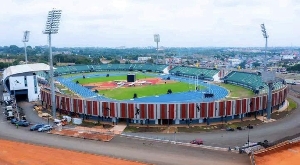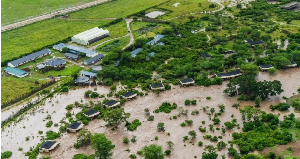- Home - News
- TWI News | TV
- Polls
- Year In Review
- News Archive
- Crime & Punishment
- Politics
- Regional
- Editorial
- Health
- Ghanaians Abroad
- Tabloid
- Africa
- Religion
- Election 2020
- Coronavirus
- News Videos | TV
- Photo Archives
- News Headlines
- Press Release
General News of Tuesday, 25 February 2003
Source:
Greater Accra Workers Demonstrate
DCL urges government to increase minimum wage
The Greater Accra District Council of Labour (DCL) of the Trades Union Congress (TUC) on Tuesday organised a four-hour demonstration through some principal streets of Accra to back their demand for a higher minimum wage.
The demonstrators encountered the Presidential Motorcade at the King Tackie Tawiah Overpass without any incident.
Reading a resolution passed at an emergency meeting of the DCL, after the demonstration, Mr Michael Osei-Boateng, Secretary of the Council, urged the government to take immediate steps to increase the 9,000 cedis minimum wage it announced last week.
The resolution questioned government's handling of labour matters saying, wage increases were "always treated as an afterthought and only when compelled by labour agitations."
The resolution signed by Mr Osei-Boateng and Ms Agnes Gyabi-Sackey, Acting Chairperson, was addressed to the Minister of Manpower Development and Employment and copied to the Secretary-General of the TUC, Ghana Employers' Association and the Chief Labour Officer.
The about 500 workers in red arm-bands bore placards some of which read, "Treat Labour With Dignity", "JAK, You Are Killing Us Softly", "What Is Good For The Minister Is Good For Workers," "Workers Are The Lifeblood Of The Economy" and "Pay More And Win More Votes."
Mr Osei-Boateng said government was undermining the labour front with the unilateral declaration of the minimum wage, especially at a time that negotiations were still ongoing.
"The 9,000 cedis announced by government as daily minimum wage is woefully inadequate and unable to cushion workers against the debilitating effects which usually accompany price increases."
He said the DCL was serving government notice of its capacity to resort to demonstrations and, therefore, called on government to immediately reconvene the National Tripartite Committee meeting to come out with an acceptable minimum wage.
The Council said if this was not done "the Council would advise itself on the next line of action to take".
Mr Osei-Boateng presented the petition to Mrs Cecilia Bannerman, Minister of Employment Manpower Development.
The Tripartite Committee made up of labour, the government and employers on Friday failed to reach an agreement on a new minimum wage after several days of negotiations.
The government and the Ghana Employers' Association (GEA) on one hand and Trades Union Congress (TUC) on the other failed to bridge the gap between them. The government later held a press conference to announce 9,000 cedis as the daily minimum wage, effective February.
The current daily minimum wage is 7,150 cedis.
Workers had been pressing hard for a new minimum wage following fuel price hike of more than 90 per cent and projected increases in tariffs of utilities in March.
A statement issued after the Tripartite Meeting said in coming to its decision, the government considered the need to control its spending, the inadequacy of revenue to meet required expenditure on development programmes and the necessity to minimise retrenchment.
The employers said they were mindful of the survival of their industries in general and particularly concerned about the inability of small and medium scale enterprises (SMEs) to incur further high cost of production.
The statement noted that organised labour was guided in its demand for a significant increase in the national daily minimum wage for 2003 by the high cost of living, which was heightened by the steep increase in fuel prices.
The pending rise in utility rates and the current low levels of incomes that impacted negatively on morale and productivity also influenced the demands by organised labour, the statement said.
It, however, promised that the social partners would further consult with their constituents and strive to reconcile their differences with a view to reaching a consensus on a new national daily minimum wage for this year.










